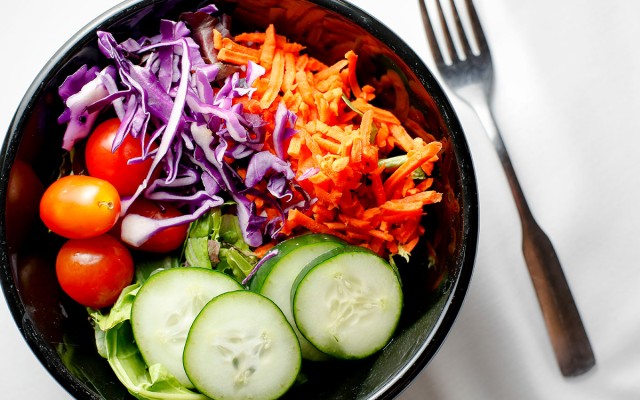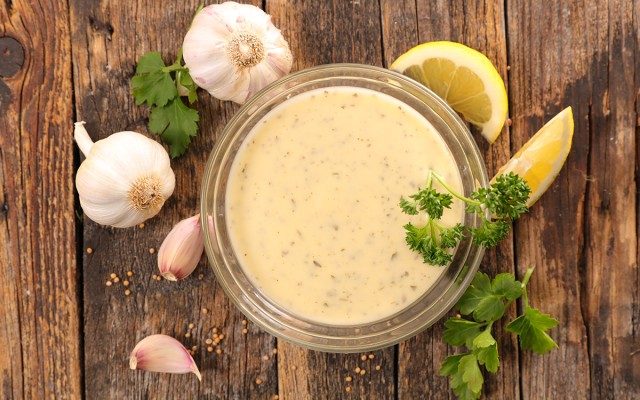4 Ways to Savor the Act of Eating

Life is busy—filled with gadgets and tasks and calendars. Yet, no matter what else you're doing, you are called to honor the needs of your animal body a few times each day. You’re invited to connect with nature through eating.
No matter how sleek and modern your life, your place within the web is indisputable. While teaching a mindful eating workshop at Kripalu, I was moved hearing guests describe the shift from viewing eating as another task to check off their list to experiencing it as a relationship to enjoy. They spoke about how that shift happens as they remind themselves to relax, slow down, and breathe.
I love that in this era of cutting-edge nutritional science, the tenets of Ayurveda, traditional Chinese medicine, and other ancient, nature-based systems seem prescient. Modern science is rediscovering what the yogis knew all along: Eating balanced meals in a calm environment, with gratitude, creates heath and healing. This simple recipe can take us far in addressing much of what ails us now.
If you feel a little disconnected from nature, please know that it’s right there waiting for you. All you need to do is remind yourself to participate. Here are four practices that can serve as reminders.
1. Say grace.
Grace helps us pause and take stock before diving into our meal. As we say grace—each in our own way—we take in the meal, breathe, and relax. In the yogic tradition, there are many mantras to bless meals and express gratitude for the profound connection of nature and life that food offers.
2. Eat your largest meal in the middle of the day (and take a break from nighttime eating).
For centuries, Ayurvedic practitioners have been recommending that we eat the largest meal of the day at noontime. Recent findings on the circadian nature of our gut microflora (the bacterial life in our lower intestines) confirm this practice, suggesting that these little gene-filled bugs—responsible for immunity and other crucial aspects of health—are more active during the day than at night. So, you digest differently at midday than at midnight, and eating your largest meal at midday will likely support your digestion and energy level.
If your schedule interferes with the time it takes to eat and digest a larger meal at midday, consider making smaller changes that can start to bring your timing into a more day-centric pattern. For example, if I’m teaching an afternoon class at Kripalu, I don’t feel comfortable eating a big lunch, so I have a slightly larger breakfast or an earlier dinner after class.
3. Keep an eye out for genetic nutritional testing.
Nutritional science is undergoing (yet another) transformation: Genetic nutrition is here. Tests are now available to tell you the range of macronutrients (carbohydrates, fat, protein) that works best for you, and the likelihood of your tolerating gluten, dairy, caffeine, or alcohol. We can now find the kinks in your genetic code that short-circuit smooth metabolic pathways for a variety of nutrients, making you require more or different forms of a nutrient or food.
“Genes are a mirror of who you are, and direct how you respond to food,” says genetic dietitian Amanda Archibald. “Your genes do not subscribe to theories about paleo or keto or any other dietary perspective other than the one that is unique to you.”
Genetic testing for nutrition is still young, so the validity of many of these tests is still under review, and insurance reimbursement can be iffy. And there are legal and other considerations with genetic testing: For example, some life insurance policies state that if you get genetic testing, they want a copy, too. Do the research on the implications before jumping in. Over time, and hopefully fairly quickly, these issues will be worked out.
4. Bring mindfulness to the table.
When you slow down and take a moment to eat with your senses, you automatically open the reconnection channel with nature. Can you take a few breaths before your next bite to admire the color and beauty of your food? Note the blush of the apple or the vibrancy of the greens. Take a few breaths to witness the life carried in the plant or animal. Breathe, relax, and honor.
Slow down and notice how it feels to bring this gift of the earth—this one bite—more deeply into your internal universe. Notice how this one bite is propelled by the muscular wave of peristalsis down your esophagus toward your belly. Notice how your body receives it.
Annie B. Kay, MS, RDN, E-RYT 500, C-IAYT, is an author, nutritionist, Kripalu faculty member, and important voice in whole-foods nutrition and yoga.
Full Bio and Programs
